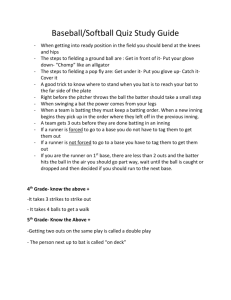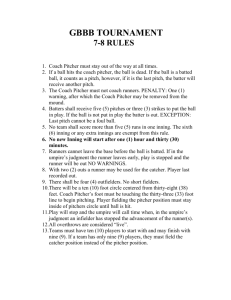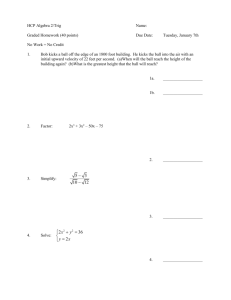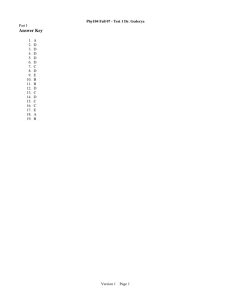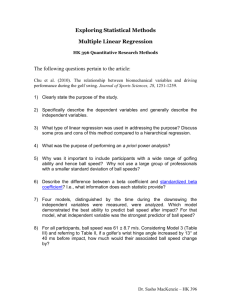greater potomac officials association - GPOA
advertisement
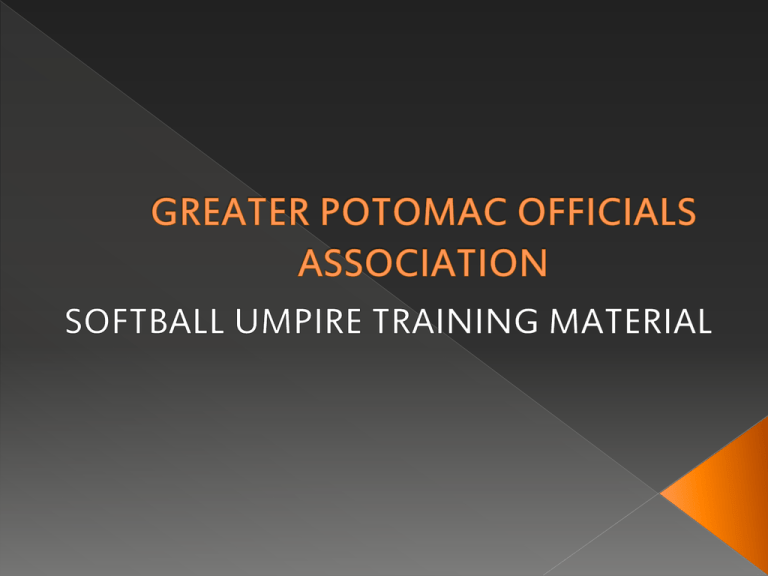
This PowerPoint presentation is an overview of
softball rules interpretation for GPOA. Please
review your ASA book for any rule changes
for the year.
2
Summer Umpire
Uniform w/Shorts
Navy ASA Cap
Powder Blue ASA Polo Shirt
Plain White Crew Neck T-Shirt
Navy Blue Shorts
◦100% Polyester
◦No pleats
◦No markings of any kind
Black Belt
White ASA Socks
Black Shoes
◦Must be completely black
Standard Umpire
Uniform w/Pants
Navy ASA Cap
Powder Blue ASA Polo Shirt
Plain White Crew Neck T-Shirt
Navy Blue Pants
◦100% Polyester
◦No pleats
◦No markings of any kind
Black Belt
White ASA Socks
Black Shoes
◦Must be completely black
4
Optional Umpire Uniform
Navy ASA Cap
Navy ASA Polo Shirt
Plain Navy Blue Crew Neck TShirt
Grey (or Navy Blue) Pants
◦100% Polyester
◦No pleats
◦No markings of any kind
Black Belt
Black/Navy Socks
Black Shoes
◦Must be completely black
5
Umpire Equipment
Ball Bag
Indicator
Brush
Coin to toss / flip
Watch (all black-can be
hung on the fence, in your
pocket, or on your belt)
Optional
(non-reflective)
Bat Ring
6
DOUBLE
Raise right arm showing two
fingers. Verbally call, "Two
Bases."
TRAPPED BALL
Extend arms straight out with
palms down. Verbally call, "Safe."
DELAYED DEAD BALL
Extend left arm straight out
with fist closed.
INFIELD FLY
Raise right arm with fist close.
Verbally call, "Infield Fly."
FAIR BALL
Point towards fair ground with
hand closest to infield. No verbal
call.
SAFE
Extend arms straight out with
palms down. Verbally call,
"Safe."
7
HOLD UP PLAY
With palm up, raise hand farthest
away from pitcher towards
batter.
FOUL TIP
Fingers from both hands are
touched together chest high in
front of body and then a strike
signal with no verbal call.
PLAY BALL
Motion with either hand to the
pitcher. Verbally call, "Play Ball."
TIME/DEAD BAL
Raise both hands with open palms
away from the body. Verbally call,
"Time" or "Dead Ball."
FOUR-BASE AWARD (SP)
On any fair touched ball going
over the fence, raise right hand
showing four fingers. Verbally
call, "Four Bases."
COUNT
Raise both arms up, indicate
strikes with fingers on right hand
and balls with fingers on left
hand. Verbally give count.
8
FOUL BALL
Give DEAD BALL signal then
verbally call, "Foul Ball"
HOME RUN
Raise right arm. With fist closed
move it in a counter-clockwise
twirling motion. Verbally call, "Four
Bases."
STRIKE
Bring left arm with hand closed to
midsection as right arm is
extended straight up with hand
facing ear. Then pull down at
elbow while closing fist. Verbally
call, "Strike."
OUT
With hand closed, bring left arm to
midsection as right arm is extended
straight up with hand facing ear.
Then pull down at elbow while
closing fist. Verbally call, "Out."
9
1
2
3
4
5
6
10
1
5
4
2
3
11
OVERHEAD “OUT”/PUNCH
“OUT”
4
5
2
3
1
1
12
3
2
1
1
13
With Partners
Initial Meting
Bat Inspection
Field Inspection
With Managers
Purpose
Safety
Keep it simple
Responsibilities ASA Certification
Holes in the
fence
Don’t run a clinic
Entrance/Exit
Cracks
Batters box
Review league
rules
Help
Dents
Rules
Altered
Time Check
Grandfathered
Incorporate any
ASA rules that
may be
applicable
FIRST IMPRESSIONS MEAN EVERYTHING – REMAIN CALM BUT CONFIDENT
14
15
Crucial: check the bats, it is your responsibility
to check bats prior to the game
If you fail to check bats (you lose credibility), do
not toss someone if an illegal, altered bat is found
Make sure the scorer has the line-up for both
teams at the start of the game
Make sure the field is playable
Call for a coach/team representative to go
over ground rules/league rules
16
Make sure you have the line-up for both teams
before game time
Make sure you have the line-up for the second
game before the end of the first game
To keep the game moving quickly, I want you to
insert the names (keep the line-up card just in case
there is a discrepancy)
The teams may/may not have a jersey number - it
is ok to ask for the batter’s name if you lose track of
the next batter
17
I would suggest writing something specific to help
you with identifying the next batter
It is not your responsibility to track batting out of
order; however, great game management is to
simply ask the batter for his/her name
Umpires in your pregame, notify both teams that
you will provide a score at the top of each inning.
This will keep teams from interrupting the scorer
and the flow of the game
Scorers – Provide the umpire with the HOME TEAM
SCORE FIRST AND THEN THE VISITORS SCORE AT THE
BOTTOM OF EACH INNING
18
The pitcher must take a position with both feet firmly on
the ground and with one or both feet in contact with the
pitcher’s plate
The pitcher must come to a full and complete stop with
the ball in front of the body. The front of the body must
face the batter. This position must be maintained at least
one second before starting the deliver
Effect: Delayed dead ball illegal pitch
The pitcher has 10 seconds to release the next pitch after
receiving the ball, or after the umpire indicates “play ball”
The pitcher shall not deliver a pitch from the glove
Effect: Ball on the batter
19
Prior to the pitch, the batter must have both
feet completely within the lines of the
batter’s box. The batter may tough the
lines, but no part of the foot may be outside
the lines prior to the pitch
Adult Slow Pitch ONLY – The batter shall
assume a one-ball one-strike count upon
entering the box
The batter must take the batter’s position in
the batter’s box within 10 seconds after
being directed to do so by the umpire
Effect: The umpire will call a strike. No pitch
has to be thrown and the ball is dead
20
Batting out of order situations have always been
considered difficult by many umpires. These situations
can become easier to rule on by keeping three
things in mind.
1.
2.
3.
Has a pitch been thrown after the incorrect batter has
batted.
Any outs made when the incorrect batter is at bat stand.
When a pitch has not been thrown, if the incorrect
batter makes an out and an appeal is made, the batter
who should have batted is out and the batter who
batted remains out and is skipped if they are scheduled
to bat.
Remember, however, if the batter who is scheduled to bat is the
third out of the inning, the correct batter to leadoff the next inning is
the player who would have come to bat had the player been put
out by ordinary play. (Rule 7, Section 2 D 3)
21
Play 1: With no outs, B9 is scheduled to bat but B1 bats. B1 hits
a fly ball that is caught by F7. Before the next pitch, the
defense appeals that B1 batted out of order.
Ruling: B9 is out as B9 is the correct batter and B1 remains out.
B2 bats next with two outs. Per Rule 7, Section 2 D 2, after the
incorrect batter has completed their turn at bat and before
the next pitch, legal or illegal, to the following batter and
before the pitcher and all infielders have clearly vacated
their normal fielding positions and have left fair territory; the
batter who should have batted is out and the next batter is
the player whose name follows that of the player called out
for failing to bat. EXCEPTION: If the incorrect batter is called
out as a result of their time at bat and is scheduled to be the
proper batter, skip that player and the next person in the lineup will be the batter.
22
Play 2: With one out, B7 is scheduled to bat, however
B8 bats. B8 hits a fly ball that is caught for the second
out of the inning. The defense appeals that B8 batted
out of order and the umpire calls B7 out for the third
out of the inning. Who is the leadoff batter in the next
inning?
Ruling: B8. In this case, since the second out of the
inning was made by B8 and the third out was made
by B7 for failure to bat in the proper order, B8 is now
the leadoff batter in the next inning. When the batter
declared out is the third out of the inning the correct
batter to leadoff the next inning is the player who
would have come to bat had the player been put
out by ordinary play. (Rule 7, Section 2 D 2 d)
23
Once you say play ball – time has begun
Take a position behind the catcher. Hold up pitch
until all players are ready
Stay in upright position until height of pitch (6-12
feet) is determined
Do not place hands on knees as this locks you at
the same height for every batter. Drop to a level
equal to the top of the front shoulder. Be in the set
position when the ball crosses the strike zone
Announce to the teams at least 10 minutes before
time expires whether you are in the last inning
Scorers (keep time) notify the umpire when they
have reached the 10 minute mark
24
The double base shall be used at first base in all divisions of play -the following rules should be enforced:
A batted ball hitting or bounding over the white portion is fair
A batted ball hitting or bounding over the colored portion is foul
When a play is being made on the batter-runner, the defense
must use the white portion and the batter-runner the colored
portion of the base
EFFECT: The batter-runner is out when there is a play being made at first base and
the batter-runner touches only the white portion; providing the defense appeals
prior to the batter-runner returning to first base
Once the runner returns to the white or colored portion of the
base, an appeal shall not be honored.
On plays at 1B when the batter-runner touches only the white
portion and collides with the fielder about to catch a thrown
ball while on the white of the base
EFFECT M-9: Interference, the ball is dead, the batter-runner is out and
runners must return to the last base occupied at the time of interference
25
On any force out attempt from the foul side of first
base the defense and the batter-runner may use
either the white or colored portion of the
base
On an errant throw pulling the defense off the white
portion of the base into foul ground, the defense and
the batter-runner can use either the white or colored
portion
On balls hit to the outfield with no play on the batterrunner advancing to first base, the batter-runner may
touch the white or colored portion
Should the batter-runner return, the runner and
defense can use the white or colored portion
When tagging up on a fly ball, the white or colored
portion of the base may be used {THE TWO BECOME
ONE}
26
OVER-RUNNING FIRST BASE
After over-running first base, the batter-
runner may legally turn to their left or right
when returning to the base. IF any attempt is
made to advance to second base,
regardless of whether the runner is in fair or
foul territory, they are liable for an appeal
out if tagged with the ball by a defensive
player while off the base..
27
Obstruction is the act of fielder:
A. Not in possession of the ball, or
B. Not in the act of fielding a batted ball
It is obstruction if a defensive player is
blocking the base or base path without the
ball and the runner or batter-runner is
impeded. Defensive players must catch
the ball, block the base and the make the
tag.
Effect: Dead Ball Signal – award bases in
your judgment the runner would have
gotten if there were no obstruction
28
Fake Tag – a fake tag occurs when a
fielder without the ball deceives the
runner by impeding their progress; for
example, causing a runner to slide, slow
down or stop running.
› Effect: This is called obstruction (delayed
dead ball). Continued fake tags should
result in an ejection. If the act is deemed
flagrant-no warning is given
› If the runner continues without breaking
stride there is no obstruction, but the
defensive player should be given a warning
29
Interference is the act of an offensive
player or team member that impedes,
hinders or confuses a defensive player
attempting to execute a play. Interference
may be in the form of physical contact,
verbal distraction, visual distraction , or any
type of distraction that hinders a fielder in
the execution of play. Defensive players
must be given the opportunity to field the
ball anywhere on the playing field or throw
the ball without being hindered.
30
RS#33: Interference is the act of an offensive player
or team member that impedes, hinders or confuses a
defensive player attempting to execute a play.
Interference may be in the form of physical contact,
verbal distraction, visual distraction , or any type of
distraction that hinders a fielder in the execution of
play. Defensive players must be given the
opportunity to field the ball anywhere on the playing
field or throw the ball without being hindered.
Effect: Ball is Dead, offensive player is called out
31
Batter
Batter Runner
Runner
Offensive player/team
Coach
Spectator
Umpire
32
ASA RS13. CRASHING INTO A FIELDER WITH THE
BALL. (INTERFERENCE)
In an effort to prevent injury and protect a
defensive player attempting to make a play on
a runner, a runner must be called out when
they remain on their feet and crash into a
defensive player who is holding the ball and
waiting to apply a tag. To prevent the out
ruling, the runner may slide, jump over the
defender holding the ball, go around the
defender or return to the previous base
touched. If the act is determined to be
flagrant, the offender is ejected. A runner may
slide into the fielder.
33
A. When a runner is called out for crashing into
a fielder holding the ball, the ball becomes
dead. Each runner must return to the last base
touched at the time of the crash as this
constitutes interference.
B. When, as in A above, the runner crashes into
a fielder holding the ball before being put out
and, in the judgment of the umpire, it was an
attempt to break up an obvious double play,
the immediate succeeding runner is also called
out. Rule 8, Section 7 J.
34
C. When a crash occurs after the runner is called out, the
runner closest to home plate is also out. Rule 8, Section 7 P.
D. When an obstructed runner crashes into a fielder holding
the ball, the obstruction is ignored and the runner is out.
(Rule 8, Section 7 Q)
› This type of award, Rule 8, Section 5 B (2 and 3), does not
give the runner the right to violate Rule 8, Section 7 Q.
E. When a runner runs outside the three-foot lane to avoid a
crash with a defender holding the ball and waiting to apply
a tag, the runner should be called out.
35
F. When a defensive player is fielding a thrown ball
and the flight of the ball carries or draws them into
the path of the base runner, it is not a crash.
G. When the ball, runner and the defensive player
arrive at the same time and place, and contact is
made, the umpire should not invoke the crash
rule, interference, or obstruction. This is merely
incidental contact, or what some persons
commonly call, “a wreck.”
› NOTE: If the ball does not enter dead ball territory in either
E or F, the ball remains live.
36
A catch is a legally caught ball, which occurs when
the fielder catch a batted, pitched or thrown ball
with the hand(s) or glove/mitt
› To establish a valid catch, the fielder shall hold the ball
long enough to prove control of it and/or that the release
of the ball is voluntary
It is not a catch if the fielder while gaining control
collides with another player, umpire, or a fence, or
falls to the ground and drops the ball as a result of
the collision
› If a ball strikes anything other than a defensive player
while it is the same as if the ball struck the ground.
› When the fielder catches the a batted or thrown ball with
anything other than the hand(s) or glove/mitt in its proper
place
37
Infield fly – a fair ball, not including a line drive
or an attempted bunt, which can be caught
by an infielder, pitcher or catcher with ordinary
effort when first and second or first, second,
and third bases are occupied with less than
two outs
RS#30: Intentionally dropped ball-the ball
cannot be intentionally dropped unless the
fielder has actually caught it, and the drops it.
Merely guiding the ball the ground is not an
intentionally dropped ball. This usually
happens when defensive players are trying to
get two/more outs
38
1) TWO THINGS PITCHER WANTS FROM UMPIRE
› a) Control of game
› b) Consistency in strike zone. Strike zone is a
strike zone is a strike zone
2) DON'T CHALLENGE OR CONFRONT PITCHER
DIRECTLY
3) MAKE IT ENJOYABLE – MANAGE THE GAME
39
Coach Argues for Three Reasons:
› 1) He thinks you might have made a mistake
› 2) To keep his players in the game
› 3) Because of temporary insanity
For a coach to request an interpretation of the rules should be expected -THE
UMPIRE SHOULD HAVE THE ANSWER.
Remember:
1. Umpires are tested by coaches
2. Particularly the newer officials
Veterans have either gained respect OR "DUG THEIR OWN GRAVE"
Respect comes from:
› 1) Sound judgment
› 2) Common sense
› 3) Proper attitude
› 4) Disposition, and
› 5) Self control
When you take charge - they notice
40
BUT IT IS SOMETIMES NECESSARY
› A) Some umpires look for ways to eject
› B) Some umpires use ejection as a means of game control
› C) Some umpires never eject- they are afraid to lose a friend
EJECTION:
› 1) If handled at the right time – good game control
› 2) If too quick- chip on shoulder
› 3) If too late- You are an umpire that can be pushed around
IF YOU EJECT A COACH OR PLAYER- ASK YOURSELF:
› 1) Did I do anything to lead to the ejection?
› 2) Did I challenge the player or coach?
› 3) Did I lose control of myself?
› 4) Did I offer opportunity to the player or coach to keep from
his losing control?
41
Hear Only What Should be Heard
› 1) Every crowd will include a heckler
› 2) Many believe it is part of the game
If Umpire Reacts:
› 1) Crowd will sense evidence of umpire frustration and increase jibes
and heckling
› 2) Soon crowds and players lose respect for umpire
Umpire Should Be:
› 1) DEAF (easier said than done)
› 2) Ignore any and all spectator comments
Fans Have Three Characteristics:
› 1) They are ignorant of the rules
› 2) They are highly emotional - highly partisan
› 3) They delight in antagonizing officials
Remember: They are not against you . . . They are against the blue shirt.
42
Eight concepts
›
›
›
›
›
›
›
›
1. ENLIGHTEN - Don't Debate
2. EXPLAIN - Don't Argue
3. CONVERSE - Don't Make A Speech
4. TALK - Don't React Critically
5. SPEAK CALMLY - Don't Shout Back
6. BE POSITIVE - Don't Be Negative
7. BE FRIENDLY - Don't Be Arrogant
8. BE CONFIDENT - Don't be meek
When dealing with people - look them in the eye.
Nothing gets across if you're looking at your shoe tips.
(FROM: "Winning At Confrontation" by Arch Lustberg)
43
›
›
›
›
›
›
1. Consistency
2. Character
3. Courage
4. Coverage
5. Communication
6. Control
Bear down at all times . . .
The only umpire who can take it easy during a
game, is one who buys a ticket and sits in the
stands.
44
GAME ASSIGNMENTS
CONTACT COMMISSIONER EARL TAYLOR
GR8RPOTMAC@COMCAST.NET
202.498.2032
SOFTBALL UIC
LORRAINE GLOSTER
GPOAPRESIDENT@HOTMAIL.COM
301.655.7454
45
